

Professor Leaves a MOOC in Mid-Course in Dispute Over Teaching - Wired Campus. Students regularly drop out of massive open online courses before they come to term.
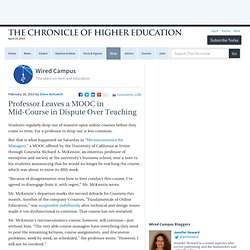
For a professor to drop out is less common. But that is what happened on Saturday in “Microeconomics for Managers,” a MOOC offered by the University of California at Irvine through Coursera. Richard A. McKenzie, an emeritus professor of enterprise and society at the university’s business school, sent a note to his students announcing that he would no longer be teaching the course, which was about to enter its fifth week. “Because of disagreements over how to best conduct this course, I’ve agreed to disengage from it, with regret,” Mr. Mr. Mr. Daphne Koller, one of Coursera’s founders, said by e-mail that Mr. Gary Matkin, the dean for distance education at Irvine, said the problem had stemmed from Mr.
“In Professor McKenzie’s view, for instance, uninformed or superfluous responses to the questions posed in the discussion forums hobbled the serious students in their learning,” said Mr. Ms. Mr. 25 Tips to Make the Most of a MOOC. Massive online open courses (also known as MOOCs) are quite popular these days.
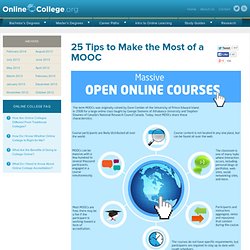
A huge, or massive, version of open online courses, these classes bring thousands together, often around the world, to learn simultaneously. Discussions, connections, and learning are the focus on MOOCs, but with the low level of commitment and their overwhelming nature, it’s easy to get disconnected. Read on, and we’ll share 25 ways to stay in the loop, on task, and get the most out of your MOOC experience. Get connected: It’s easy to lose interest and drop out of a MOOC, but don’t let that happen.
Find at least one other person to keep you connected to the course, and you’ll be much more likely to stay on track.Introduce yourself and share ways to connect: Be sure that you’re easy to find if your coursemates would like to connect with you. How NOT to Design a MOOC: The Disaster at Coursera and How to Fix it. I don’t usually like to title a post with negative connotations, but there is no way to put a positive spin on my experience with the MOOC I’m enrolled in through Coursera, Fundamentals of Online Education: Planning and Application.
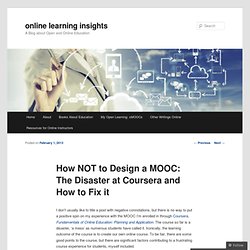
The course so far is a disaster, ‘a mess’ as numerous students have called it. Ironically, the learning outcome of the course is to create our own online course. To be fair, there are some good points to the course, but there are significant factors contributing to a frustrating course experience for students, myself included. Group Chaos There are three key factors contributing to this course calamity and all link to the group assignment. The first, a ‘technical glitch’ was big enough to cause one of Google’s servers to crash. The course started Monday, January 28, 2013 and problems began on day one when participants were instructed to ‘join a group’. What happens When Group Work Goes Haywire This course will be collaborative in nature.
Like this: With ePortfolio Evidence. C-Level View | Feature The Taming of the MOOC--With ePortfolio Evidence By Trent Batson01/16/13 The IT revolution that was supposed to transform higher education has failed to materialize, at least in the way we had imagined it.
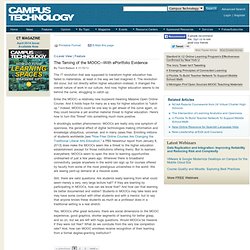
The revolution did occur, but not directly within higher education--instead, it changed the overall nature of work in our culture. And now, higher education seems to be behind the curve, struggling to catch up. Enter the MOOC--a relatively new buzzword meaning Massive Open Online Course. #mmc13 - MOOC Maker-Course.
IV MOOC. MOOCs. MOOCS: News, Theory, Practice. Making Sense of MOOCs: Musings in a Maze of Myth, Paradox and Possibility. A Quick Guide To The History Of MOOCs. This Is How Students Use School Websites 8.45K Views 0 Likes It's important to have a proper appearance online. So why are there so many unhelpful school websites out there? This infographic shares what students want. Why TED Talks Have Become So Popular 5.67K Views 0 Likes TED talks are useful and free ways to bring high-level thinking and through-provoking ideas into the classroom and your home. The MOOC Model: Challenging Traditional Education (EDUCAUSE Review. Key Takeaways A turning point will occur in the higher education model when a MOOC-based program of study leads to a degree from an accredited institution — a trend that has already begun to develop.
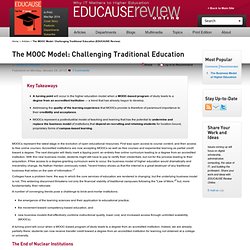
Addressing the quality of the learning experience that MOOCs provide is therefore of paramount importance to their credibility and acceptance. MOOCs represent a postindustrial model of teaching and learning that has the potential to undermine and replace the business model of institutions that depend on recruiting and retaining students for location-bound, proprietary forms of campus-based learning. MOOCs represent the latest stage in the evolution of open educational resources. First was open access to course content, and then access to free online courses. Colleges have a problem here: the way in which the core services of education are rendered is changing, but the underlying business model is not.